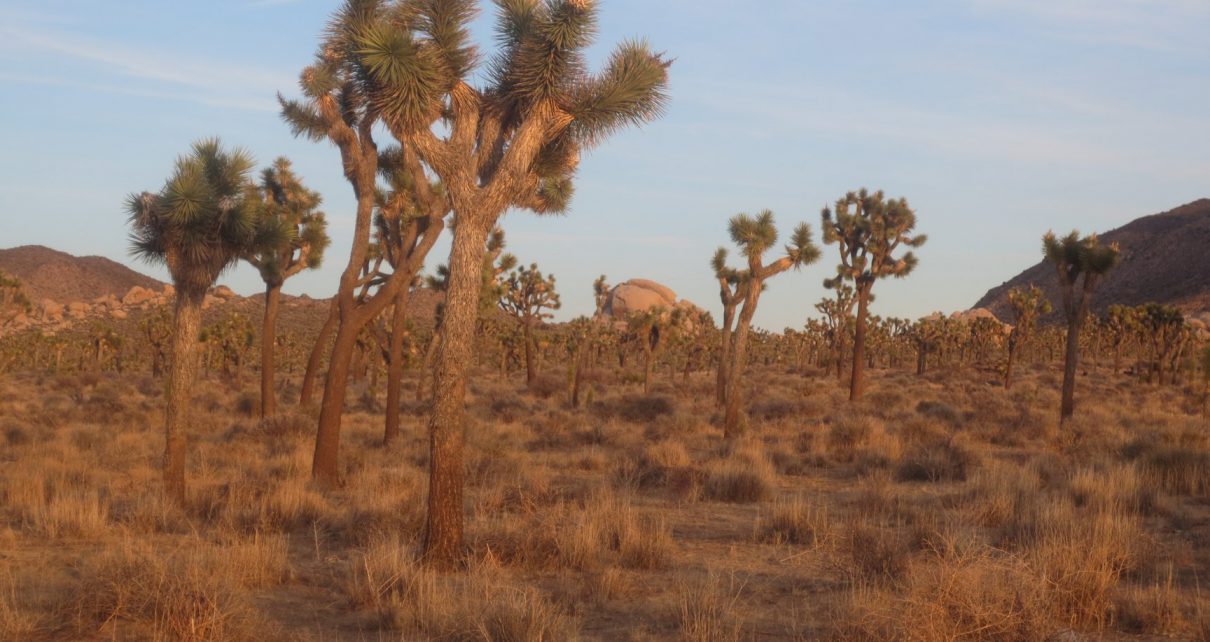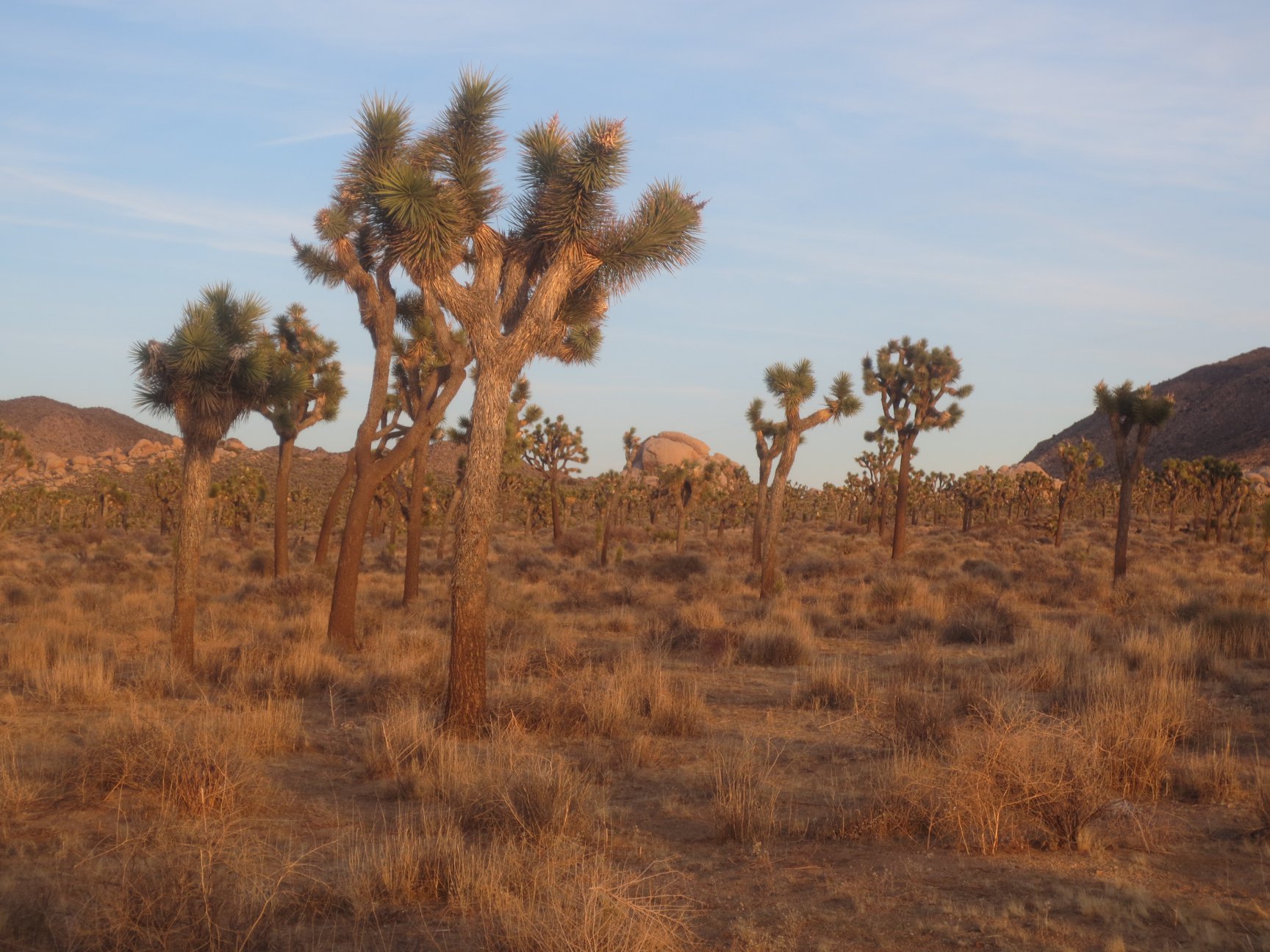
Joshua trees in Joshua Tree National Park. (Photo: Evan Symon for California Globe)
Joshua Trees Receive Massive Protections Under Passage Of Budget Trailer Bill
Western Joshua Tree Conservation Act to add many new hurdles for developments in areas with tree
By Evan Symon, June 28, 2023 1:31 pm
The western Joshua tree received permanent protections on Tuesday after years of previous attempts by lawmakers and environmental groups by being passed through a budget trailer bill rather than a more traditional endangered or threatened species listing.
Federally, an attempt in 2019 to list the tree as an endangered species fell through, although future attempts may come back soon. At the state level, the California Fish and Game Commission (FGC) granted endangered species protections for the tree in 2020 for one year. The action pumped the brakes on dozens of developments on private land in San Bernardino County alone, with the growing town of Joshua Tree stunted in the middle of the COVID-19 pandemic. Further city restrictions on Joshua tree removal throughout the county have also been passed, with the County recently installing $20,000 fines and six months in jail for third offenses.
However, since then, the Joshua tree has been delayed on a final decision by the FGC, with a delayal last year continuing over into 2023. With an official threatened or endangered species listing at a stalemate, supporters of protecting the tree went a different route and decided to have the protections go straight through the legislature. As part of a massive trailer bill passed with the state budget on Tuesday, the Western Joshua Tree Conservation Act did what Joshua tree protection supporters had been unable to do for years – get permanent protections for the tree.
According to the Act, passed under the SB 122 trailer bill, the trees are to remain only a candidate for being officially listed as an endangered species in California until a proper vote on the designation in the future, but are to otherwise get all protections of the statute. This includes prohibiting unpermitted killing or removal of the trees, requiring a conservation plan for the species, creating a state fund to acquire and manage lands to protect the tree, creating a permit process for Joshua tree removal, unauthorized importing/exporting of the tree to/from the state, and requiring regular reviews of the status of the tree.
Specifically, harming or removing trees without permits will now be illegal under California law, with the California Department of Fish and Wildlife (DFW) authorizing permits. However, permits will only be okayed following a lengthy process, including documenting every tree on the property in question, the payment of fees which could be as much as $1,000 per tree, tree relocation, and having new habitat be preserved for the trees following each permit. Housing developments and public works projects will also have tree removal limits, with developers not allowed to remove more than 10 trees from a housing project site, or more than 40 trees from a public works site.
Fees will also be more expensive for any site nearby Joshua Tree National Park or state parks with the trees in them.
Environmental groups praised the passage of the Act on Wednesday, noting the many years of vote hold ups by state agencies.
Joshua trees receive new protections
“I’m grateful the Newsom administration and lawmakers agree that western Joshua trees are an irreplaceable part of California’s natural heritage that has to be protected,” said Center for Biological Diversity conservation director Brendan Cummings in a statement. “This groundbreaking law will help ensure these wonderful trees remain part of California’s Mojave Desert landscape forever. The California Endangered Species Act is our most important biodiversity protection law, and western Joshua trees clearly qualify as threatened. As the first species in the state to be protected because of climate change, they deserve the special measures contained in the new conservation act.”
However, many cities and towns affected by the bill noted that developments, specifically lower-cost housing developments that many Southern California residents have been going to for cheaper housing, will either be slowed, delayed, or outright killed because of the new requirement.
“San Bernardino County greatly values the Western Joshua tree as an iconic symbol of the Mojave Desert and actively supports efforts to protect and preserve the species,” said the County in a press release. “However, the county opposed the Western Joshua Tree Conservation Act Budget Trailer Bill because it fails to properly balance the protection of the species with the needs of our residents and business community, thereby threatening the quality of life in our deserts.”
Others noted that towns due for major growth, such as the town of Joshua Tree, will now likely see most projects killed due to so many waiting on the decision from the state.
“I don’t know how we can really build anything substantial out there anymore,” explained Paul Lin, a developer who has been a part of projects in the desert in the past, to the Globe on Wednesday. “Most of the time you just cannot build around trees, and all the costs of removing the trees and relocating or what have you, especially near the big parks, it is gigantic when all is said and done. A lot of people were due to move to these desert cities because of high housing costs in LA and all around there. Now? It is just not going to work.”
“We need new housing, specifically, cheaper housing in the state. Here are areas with a cheaper cost of living. Rents and purchase prices will be cheaper. Now they won’t, if anything new gets built at all. Or if it does, there are going to be so many new hoops that many just won’t bother now. This is going to cause a lot of problems. A lot.”
A vote on officially making the Joshua tree a threatened or endangered species by the FGC is likely to occur in the near future.
- Bill to Require Law Enforcement Disclosure if AI Was Used To Help Write Reports - August 7, 2025
- Gov. Newsom Files FOIA Request To ‘Expose True Cost’ Of L.A. Federal Troop Deployment for Anti-ICE Riots - August 6, 2025
- California Redistricting: How Newsom’s Plan Will Demolish Hard Fought GOP Gains - August 6, 2025




